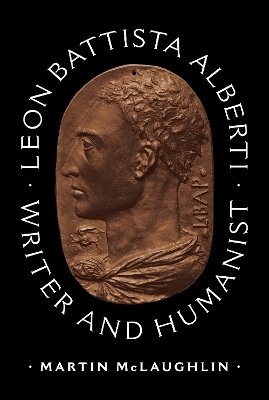
Leon Battista Alberti
Writer and Humanist
Seiten
2024
Princeton University Press (Verlag)
978-0-691-17472-3 (ISBN)
Princeton University Press (Verlag)
978-0-691-17472-3 (ISBN)
The first book in English to examine Leon Battista Alberti’s major literary works in Latin and Italian, which are often overshadowed by his achievements in architecture
Leon Battista Alberti (1404–1472) was one of the most prolific and original writers of the Italian Renaissance—a fact often eclipsed by his more celebrated achievements as an art theorist and architect, and by Jacob Burckhardt’s mythologizing of Alberti as a "Renaissance or Universal Man." In this book, Martin McLaughlin counters this partial perspective on Alberti, considering him more broadly as a writer dedicated to literature and humanism, a major protagonist and experimentalist in the literary scene of early Renaissance Italy. McLaughlin, a noted authority on Alberti, examines all of Alberti’s major works in Latin and the Italian vernacular and analyzes his vast knowledge of classical texts and culture.
McLaughlin begins with what we know of Alberti’s life, comparing the facts laid out in Alberti’s autobiography with the myth created in the nineteenth century by Burckhardt, before moving on to his extraordinarily wide knowledge of classical texts. He then turns to Alberti’s works, tracing his development as a writer through texts that range from an early comedy in Latin successfully passed off as the work of a fictitious ancient author to later philosophical dialogues written in the Italian vernacular (a revolutionary choice at the time); humorous works in Latin, including the first novel in that language since antiquity; and the famous treatises on painting and architecture. McLaughlin also examines the astonishing range of Alberti's ancient sources and how this reading influenced his writing; what the humanist read, he argues, often explains what he wrote, and what he wrote reflected his relentless industry and pursuit of originality.
Leon Battista Alberti (1404–1472) was one of the most prolific and original writers of the Italian Renaissance—a fact often eclipsed by his more celebrated achievements as an art theorist and architect, and by Jacob Burckhardt’s mythologizing of Alberti as a "Renaissance or Universal Man." In this book, Martin McLaughlin counters this partial perspective on Alberti, considering him more broadly as a writer dedicated to literature and humanism, a major protagonist and experimentalist in the literary scene of early Renaissance Italy. McLaughlin, a noted authority on Alberti, examines all of Alberti’s major works in Latin and the Italian vernacular and analyzes his vast knowledge of classical texts and culture.
McLaughlin begins with what we know of Alberti’s life, comparing the facts laid out in Alberti’s autobiography with the myth created in the nineteenth century by Burckhardt, before moving on to his extraordinarily wide knowledge of classical texts. He then turns to Alberti’s works, tracing his development as a writer through texts that range from an early comedy in Latin successfully passed off as the work of a fictitious ancient author to later philosophical dialogues written in the Italian vernacular (a revolutionary choice at the time); humorous works in Latin, including the first novel in that language since antiquity; and the famous treatises on painting and architecture. McLaughlin also examines the astonishing range of Alberti's ancient sources and how this reading influenced his writing; what the humanist read, he argues, often explains what he wrote, and what he wrote reflected his relentless industry and pursuit of originality.
Martin McLaughlin was Agnelli-Serena Professor of Italian at the University of Oxford from 2001 to 2017 and is now an emeritus fellow of Magdalen College, Oxford. He is the author of Literary Imitation in the Italian Renaissance and Italo Calvino. He has translated Italo Calvino: Letters 1941–1985 (Princeton), Calvino's Why Read the Classics? and Leon Battista Alberti’s Biographical and Autobiographical Writings.
| Erscheinungsdatum | 05.07.2024 |
|---|---|
| Zusatzinfo | 17 b/w illus. |
| Verlagsort | New Jersey |
| Sprache | englisch |
| Maße | 140 x 216 mm |
| Themenwelt | Geschichte ► Allgemeine Geschichte ► Neuzeit (bis 1918) |
| Geisteswissenschaften ► Geschichte ► Regional- / Ländergeschichte | |
| Geisteswissenschaften ► Sprach- / Literaturwissenschaft ► Anglistik / Amerikanistik | |
| Geisteswissenschaften ► Sprach- / Literaturwissenschaft ► Literaturwissenschaft | |
| Technik ► Architektur | |
| ISBN-10 | 0-691-17472-5 / 0691174725 |
| ISBN-13 | 978-0-691-17472-3 / 9780691174723 |
| Zustand | Neuware |
| Informationen gemäß Produktsicherheitsverordnung (GPSR) | |
| Haben Sie eine Frage zum Produkt? |
Mehr entdecken
aus dem Bereich
aus dem Bereich
Giordano Bruno - ein ketzerisches Leben
Buch | Hardcover (2024)
C.H.Beck (Verlag)
29,90 €
das dramatische 16. Jahrhundert
Buch | Hardcover (2024)
Rowohlt Berlin (Verlag)
34,00 €
Kunst und Gesellschaft an der Schwelle zur globalen Welt
Buch | Hardcover (2024)
Klett-Cotta (Verlag)
42,00 €


